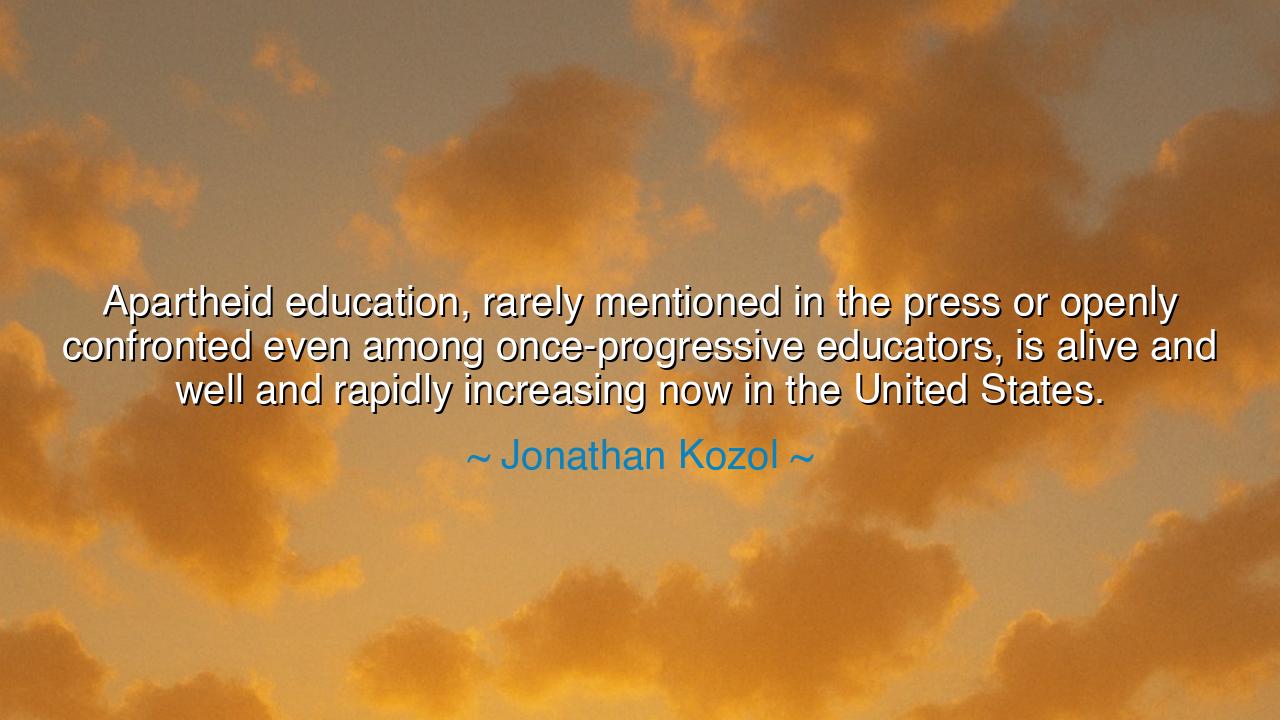
Apartheid education, rarely mentioned in the press or openly
Apartheid education, rarely mentioned in the press or openly confronted even among once-progressive educators, is alive and well and rapidly increasing now in the United States.






The words of Jonathan Kozol fall like a heavy stone upon the conscience of a nation: “Apartheid education, rarely mentioned in the press or openly confronted even among once-progressive educators, is alive and well and rapidly increasing now in the United States.” In this statement, he names a bitter truth often hidden behind silence and denial. Though the chains of official segregation were broken decades ago, Kozol warns that a subtler, yet equally cruel, form of division endures—one that separates children not by law, but by poverty, by neighborhood, and by the quiet indifference of society.
What is meant by apartheid education? It is the condition in which children of different races and classes are educated in separate and unequal schools. It is a system where the wealth of one community creates gleaming classrooms, advanced programs, and boundless opportunities, while across town, another community struggles with overcrowded rooms, outdated books, and dwindling hope. Kozol, who devoted his life to chronicling these injustices, insists that this is not an accident, nor a relic of the past, but a living reality perpetuated in silence.
The history of America bears witness to this injustice. After the Supreme Court’s decision in Brown v. Board of Education (1954), it was declared that “separate but equal” was a lie, that segregated schooling violated the very promise of democracy. For a time, hope was kindled, and children of different colors began to learn side by side. But in the decades that followed, segregation reemerged—not by decree of law, but by the invisible walls of housing, wealth, and policy. Schools became divided once more, not by legal chains but by the iron grip of economics. Kozol’s cry reveals this hidden wound: that America has drifted backward into a condition its people once vowed to overcome.
Consider the story of a child in a wealthy suburb, surrounded by laboratories, libraries, and fields of opportunity, compared to a child in an impoverished city school with leaky ceilings and overcrowded classrooms. Both are children of the same nation, yet their futures diverge before they are even given a chance. The first is lifted by privilege, the second weighed down by neglect. This is apartheid education—a system where destiny is too often decided not by the soul of the student, but by the wealth of the soil in which they are planted.
The tragedy lies also in silence. Kozol laments that the press rarely mentions it, and educators who once fought for justice often turn away, weary or fearful of confrontation. Yet silence is not neutrality; it is complicity. When injustice is allowed to grow unnoticed, it becomes entrenched, disguised as “normal.” In this way, inequality deepens while the nation deceives itself that progress has already been won.
The meaning of Kozol’s words is both warning and call: if this system is allowed to continue, then the very promise of democracy is hollow. A nation cannot proclaim liberty and equality while denying equal education to its children. The future of a people rests in its classrooms. To starve them of justice is to starve the nation itself of hope, innovation, and strength. Apartheid education is not merely a failure of schools—it is a failure of conscience, a betrayal of the generations yet unborn.
The lesson for us is clear: we must confront this injustice boldly. Citizens must demand equity in funding, policies that break the chains of inequality, and leaders who refuse to accept segregation in any form. Parents and teachers must raise their voices, refusing to let silence become the language of complicity. And in our own lives, we must recognize that the fate of another’s child is bound to our own, that the health of a society is measured not by the success of a few, but by the opportunities given to all.
Therefore, O listener, hear Kozol’s warning: apartheid education is alive and well—but it need not endure. If we awaken, if we speak, if we act, then classrooms once divided may yet become gardens of unity, where every child, regardless of color or wealth, is given the chance to grow. Let this be the law of our time: that no child is forgotten, that no school is abandoned, and that the dream of equality, once promised, is finally fulfilled. For to heal the schools is to heal the nation itself.






AAdministratorAdministrator
Welcome, honored guests. Please leave a comment, we will respond soon